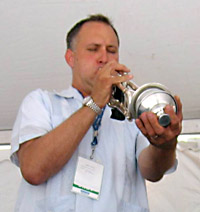
Daniel Godston
reviews
Blue Lash
by James Armstrong
Milkweed Editions (ISBN 1-57131-424-5/978-157131-424-6)
This review is about 4 printed pages long. It is copyright © Daniel Godston and Jacket magazine 2007.
1
Blue Lash is an excellent collection of poems that portrays Lake Superior. The book’s three sections — “North of Duluth,” “Isle Royale,” and “South Shore” — create a triptych poetic map of the lake. The poems examine Lake Superior’s power, moving from closely described minutiae to bigger picture portrayals of ecotone (where nature interacts and intersects with humans and industry).
2
Blue Lash is full of remarkable turns of phrase. Images such as, “All day one crow has been rowing / his creaky oars / up and down the shore road” (from “Three Crow Songs”); unusual personification such as this geological formation, “It rests on one pained hip, / tilted vertiginously / toward the Pleistocene” (from “Basalt Outcrop”); and fantastic similes such as, “we go on like a damaged propellar / cavitating in the foam” (from “Unquenchable Ontological Thirst”) — are some aspects of this intimate tour of Lake Superior.
paragraph 3
One of Blue Lash’s strengths is the way by which Armstrong magnifies details from what he takes in. He shows us nature’s presence, such as in “Orange Lichen” —
4
But orange lichen is splashed
all over the boulders —
close up, the petalled structure
expands from the center
like suburbs or cancer, the optimism
of an organism
bent on wringing the silence from each stone.
5
I like how he uses the verb “splash,” transforming a solid organism into something with liquid qualities. “the optimism / of an organism” is an inventive phrase.
In “Castaways,” he describes all rocks and pebbles he encounters on the beach —
6
The storm waves banged all night —
an insane percussion section.
Now the beach seems garish,
crowded with castoffs. It’s
a museum of the orphaned and abandoned,
the Kwik Trip of preforms,
the junkshop or stones. My boots clack along the strand,
stirring up quartz eyes
hazed with glaucoma,
chipped flywheels, miniballs...
7
Those vivid images put you right there on the beach with him — you can see and feel those rocks. It is interesting how the poems in Blue Lash respond and resonate with one another. For instance, one stone in “Castaways” becomes the subject of the ode titled “Quartz Pebble”: “If Melville doesn’t mention you / in his chapter on pallor, / it’s only because to hold you / is to grow more intimate / with seams and lodes, / shadow organs.”
8
Armstrong wrote many of these poems while he was an artist in residence at Isle Royale National Park and Hiawatha National Forest on Grand Island. He describes the poignancy and intensity of being alone at various times. “A Week Away,” which is a love poem addressed to his wife Laura —
9
...I think of
how you slid these black beans
from the dispenser,
so they felt like bees in a sack...
how I am sharpening my heart
now, on the grit of your absence,
laying it on the whirling surface
of the day, until
I can feel it grow incandescent,
trailing the hair of a comet, as
whatever does not love you streaks away.
10
This love poem, written in solitude, contains amazing images, and it almost leaves you with the smell of strong coffee. “Aubade” is addressed to a cabin where he stayed just north of Duluth:
11
Good-bye, Cabin Seven, my
rented Walden, my
cockpit hermitage,
where threshed out the old
lover’s quarrel with language.
Good-bye, lake,
restless basin of sibilants,
you who keep the climate cool
and wet the mind’s appetite
for transcendence.
12
It is touching and kind of funny how he addresses Cabin Seven, imbuing it with personality. I like the innovative personification, “the mind’s appetite / for transcendence.” His use of “wet,” and the wordplay with the implied “whet,” is great.
13
Blue Lash engrossingly captures Lake Superior’s intimate details, and those details contribute to a majestic mosaic of the lake. Here is an example of how Armstrong pans and zooms — “The cicadas grind their teeth / under the blue roof of August, / the heat places its heavy hand on the landscape, / but you never flinch” (from “Bella Donna”). Blue Lash is a wonderful triptych and portrait of Lake Superior.

Daniel Godston
Daniel Godston teaches, writes, and creates music in Chicago. His work has appeared in Chase Park, Versal, Drunken Boat, 580 Split, Kyoto Journal, Eratica, California Quarterly, after hours, and other publications, and is forthcoming in Moria, horse less review, and Sentinel Poetry. His poem “Mask to Skin to Blood to Heart to Bone and Back” was nominated by the editors of 580 Split for the Pushcart Prize. In February 2007 he curated the Forth Sound Back event, in the Red Rover Series. He works with the Borderbend Arts Collective to organize the annual Chicago Calling Arts Festival, which provides opportunities for Chicago based artists to collaborate with artists living in other locations around the world.
The Internet address of this page is http://jacketmagazine.com/34/godston-armstrong.shtml